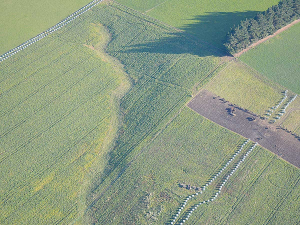Ministry for the Environment to sponsor Ballance Farm Environment Award
The Ministry for the Environment is joining as a national award sponsor in the Ballance Farm Environment Awards (BFEA from next year).
 Encroachment of residential living onto productive farmland will mean the farmers who remain will face higher land values and higher rates.
Encroachment of residential living onto productive farmland will mean the farmers who remain will face higher land values and higher rates.
OPINION: The recent Our Land 2021 report released by the Government is a wake-up call.
In our quest to build houses for a burgeoning population, productive agricultural land is being swallowed up by housing developments.
With Auckland’s population set to hit 2 million in the next decade, pressure for both housing and food will rise.
New Zealand will have 6.8 million consumers by 2073, the Ministry for Environment (MfE) report says, and food growers will also be responding to overseas demand for New Zealand food exports.
While most dairy farms are not affected by the urban sprawl, if productive land was is not available for agriculture, it forces less suitable areas to be used.
The report goes on to say that the land used for agriculture has been decreasing since 2002. It says between 2017 and 2019 it fell by 2%. In terms of dairying, the report notes the increase in cow numbers and the greater use of irrigation, especially for dairy farming.
Any encroachment of residential living onto productive farmland not only means a loss of that farming land, it also has consequences for those farmers who remain.
They face higher land values and consequently higher rates, along with increased council rules and restrictions that fall upon them due to increased amenity expectations of those new urban residents.
Export earnings from NZ land-based primary industries shot up 91% - from $23 billion in 2010 to $44 billion in 2019. The MfE report notes the Government wants those earnings to grow by another $44 billion in the next decade to support post-covid economic recovery.
Federated Farmers describes this as “a hairy and audacious goal” when you consider that since 2002 nearly 1.9 million hectares has gone out of agriculture and horticulture production.
They point out that, even more tellingly, of our most highly productive land (flat, best soils), the amount lost to urban sprawl and lifestyle blocks jumped 54% from 69,920 hectares in 2002 to 107,444 hectares in 2019.
NZ farmers are just getting on with driving up production from less land and from management and genetic improvements. But there comes a time when they run up against the limits of nature and efficiency.
The time has come for NZ to better manage where we are building houses and stop building on land best suited to growing healthy food for people.
OPINION: "We are back to where we were a year ago," according to a leading banking analyst in the UK, referring to US president Donald Trump's latest imposition of a global 10% tariff on all exports into the US.
DairyNZ says the Government’s proposed Resource Management Act reform needs further work to ensure it delivers on its intent.
Overseas Trade Minister Todd McClay says he's working constructively with the Labour Party in the hope they will endorse the free trade agreement (FTA) with India when the agreement comes before Parliament for ratification.
Donald Trump's latest tariff tantrum has again thrown the world of trade into a new round of turmoil and uncertainty, and NZ is caught up in it.
The third edition of the NZ Dairy Expo, held in mid-February in Matamata, has shown that the KISS principle (keep it simple stupid) was getting a positive response from exhibitors and visitors alike.
Twenty years ago, South African dairy farm manager Louis Vandenberg was sent to a farm in Waikato to provide training on Afimilk technology.
OPINION: Expect the Indian free trade deal to feature strongly in the election campaign.
OPINION: One of the world's largest ice cream makers, Nestlé, is going cold on the viability of making the dessert.